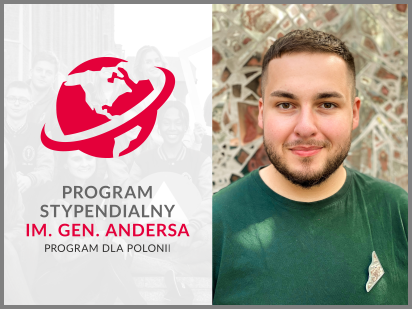Beneficiaries of the Anders NAWA programme are Polish young members of the Polish diaspora from various parts of the globe, including Brazil, Georgia, Czechia, Ukraine, and Kazakhstan. Although they come from so many different places and have different stories, there are some elements that they share: the scholarship holders have Polish roots, want to make a symbolic return to their fatherland, and have taken up their dream studies.
One of the beneficiaries of NAWA’s programme for the Polish diaspora is Stanisław Apriłaszwili. He was born in Lviv and has not only Polish, but also Georgian origins! Stanisław admits that the language spoken in his family home is Polish. Moreover, his education began in a Polish kindergarten and a Polish school. He left his home city at the age of 17 in order to take up his dream studies at the University of Warsaw. Today, he is the University’s graduate – in a way. After completing his first and second-degree studies, he decided to follow his passion and enthusiasm and continue education at the University of Warsaw’s Doctoral School of Humanities.
Poland is a country of many opportunities, where every young person – whether Polish or foreign – can achieve their ambitions!
NAWA: Why did you choose to study in Poland?
Stanisław Apriłaszwili: Ever since I was a child, I have seen Poland as a different world. I grew up in Lviv, and with the frequent successive trips to Poland, I grew to believe that the quality of life and studies there were very high. The arguments that ultimately convinced me to go to university in Poland were the rich offer of student exchange and projects as well as a diploma that was valued abroad. In the course of my studies, I met wonderful people to whom I owe my personal and academic development. This is why I don’t regret my decision from seven years ago.
What did you most enjoy about studying in Poland?
What I value most of all is multiculturalism. The exchange of experience, observations and ideas is the foundation of academic discourse. The annually increasing number of foreigners in Poland additionally facilitates making contacts and exchanging ideas. I value the free partner-like debate with academic staff and the fact that the lecturers truly care about their students’ progress.
My first programme of studies, that is Polish philology, is rather special and not internationalised, but I had the opportunity to make contacts with people of various nationalities in student organisations or at the dorm. The existing student organisations and study groups are one of the greatest advantages of studying in Poland. I came to the university when I was 17. After several months, I decided to join the Independent Students’ Association. This organisation helped me adapt to university life and gave me an opportunity to dedicate myself to non-academic activities, as well. Several years later, I joined the Forum of Young Diplomats in order to gain new experiences.
How did the scholarship under the Gen. Anders Programme influence your development?
The Gen. Anders scholarship made it possible for me to come and study in Poland. I come from a country where the earnings are low and higher education is fairly expensive.
I’m of Polish origin, so the choice of a Polish university was obvious. I hesitated for a moment, because I was 16 when I applied for the scholarship – I was worried whether I could manage living on my own. Yet the move to Poland taught me self-reliance.
The Gen. Anders scholarship supported me for the entire duration of my studies in Poland. As a result, I could spend much time on studying and developing as a person. In addition, I could purchase equipment I needed for my studies, and I paid for online courses and attended scientific conferences.
Is the participation in international exchange programmes a vital element of a young person’s development? Are these programmes worth participating in?
In the globalised world, studies abroad are the foundation for each young person. Apart from the crucial cultural element, a young person who has experienced living abroad on their own develops mentally and socially. Academic exchange is above all exchange of knowledge and experience, which is why I think as many students as possible should do it in order to widen their horizons.
Thank you for your time.

The gen. Anders Programme
Anders NAWA is a scholarship programme dedicated to young people of Polish origin who would like to take up full-time first-degree, second-degree or uniform Master’s degree studies in Polish at a Polish university.
A novelty in this year’s call is a broader group of eligible candidates. So far, the programme was open to persons who had documented their Polish origin or held the Card of the Pole (Karta Polaka). This year’s applications for first-degree and uniform Master’s degree studies may be submitted also by holders of Polish and foreign citizenship who completed their entire secondary school education outside of Poland.
The programme covers a monthly scholarship amounting to between PLN 1,250 to PLN 1,700, depending on the level of studies.
Applications under this year’s call for applications may be submitted until 18 May 2021 via NAWA’s IT system – SUBMIT AN APPLICATION
First-degree and uniform Master’s degree studies – Call for Applications and Regulations
Second-degree studies – Call for Applications and Regulations










